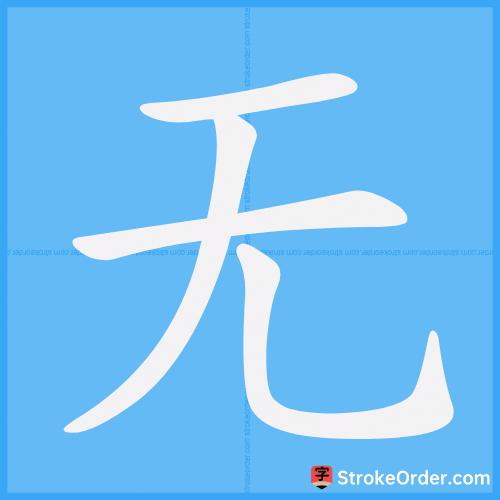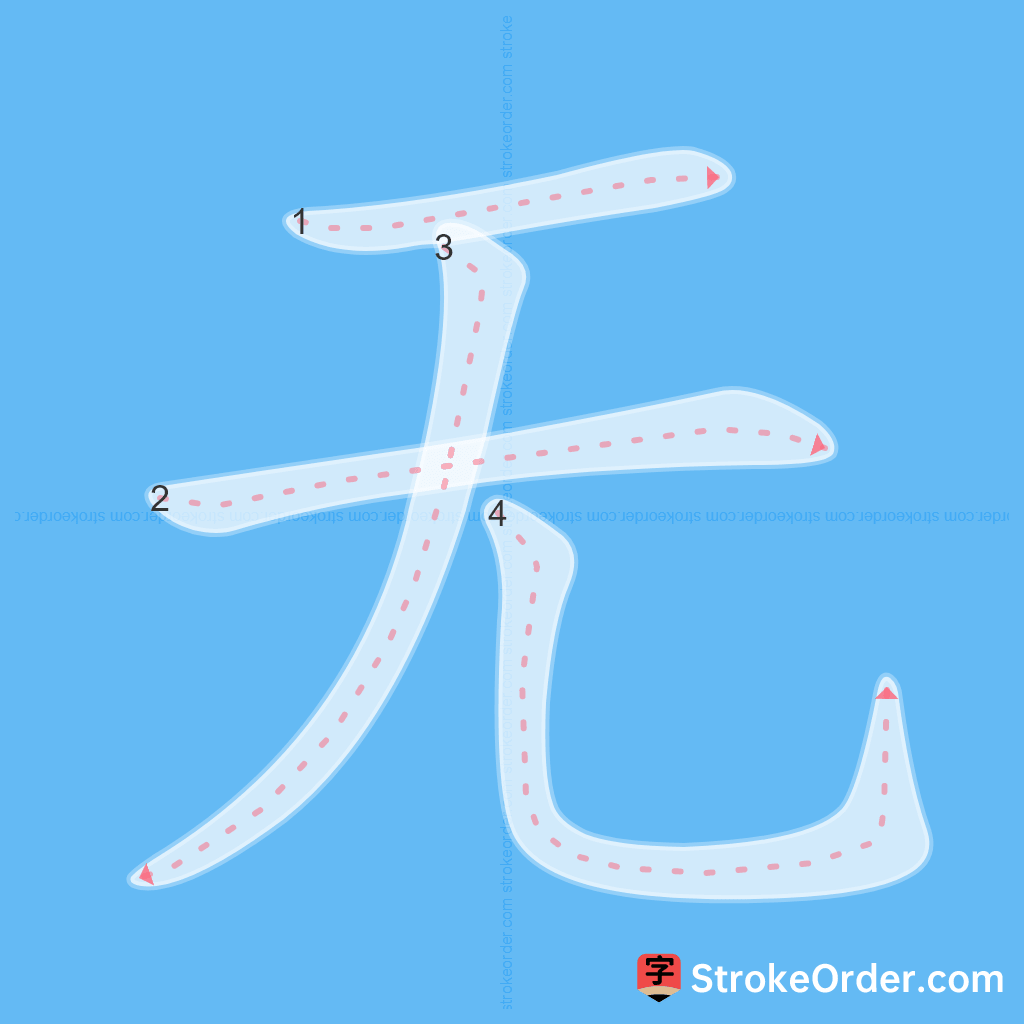无 Stroke Order
Animated Stroke Order of 无

Stroke Order Diagrams for 无

Step-by-Step Handwriting Guide for 无

Learn to Write Chinese Characters with Video Tutorials
Watch the video of writing the Chinese character "无", learn the correct stroke order (笔顺) of the character "无", and master the standard way of writing the character "无".
Free Printable Handwriting Practice with Stroke Order: 无
Printable Writing Practice Worksheet of "无" in Portrait Orientation (Tian Zi Ge)

Printable Writing Practice Worksheet of "无" in Landscape Orientation (Tian Zi Ge)

Information of 无
Pinyin
wú、 mó
Radical
一
Strokes
4 strokes
Usage
★★★★★
Definition
-less / not to have / no / none / not / to lack / un-
无
wú
1. No, opposite of "you"; not.
没有,与“有”相对;不。
Examples:
- 无辜 (not guilty)
- 无偿 (not compensating)
- 无从 (no way or means)
- 无度 (without measure)
- 无端 (unjustifiable)
- 无方 (without method, opposite of "有方")
- 无非 (merely, just)
- 无动于衷 (unmoved)
- 无所适从 (at a loss)
2. (Noun) Original meaning: Dance
本义: 乐舞
Etymology: A pictogram representing a person dancing holding a tool. Same character for "无" and "舞" in oracle bone inscriptions and bronze inscriptions.
3. (Noun) Philosophical category referring to the formless, nameless, or nothingness, or a subtle state of matter.
哲学范畴,指无形、无名、虚无等,或指物质的隐微状态。
English: Nihility
4. (Verb) To not have, opposite of "you".
没有,跟“有”相对。
English: not have; there is not
Example: 无,不有也 (no, there is not).
5. (Adverb)
1. Not, indicating negation of verbs or adjectives.
不,表示对动词或形容词的否定。
Example: 无偏无党 (impartial)
2. Also written as "毋", indicating advice or prohibition, could be translated as "don't" or "not".
通“毋”,表示劝阻或禁止,可译为“不要”、“别”。
Example: 君子食无求饱 (the gentleman does not seek fullness in food).
3. Not yet, not at any previous time.
未,不曾,没。
4. Need not, not worth.
不必,不值得。
5. Also see: mō (南无).
6. (Pronoun) Indicating indefinite people, events, times, places, etc.
表示不定指的人、事物、时间、处所等。
English: nothing
7. Connector for clauses or phrases, indicating this applies under any condition or situation, equivalent to "regardless of".
连接词组或分句,表示在任何条件或情况下都是如此。
8. (Grammatical usage)
1. Used at the beginning of a sentence, it has no specific meaning.
2. Used at the end of a sentence, it indicates a questioning tone, may translate to “?”
Example: 能饮一杯无? (Can you drink a cup?)
9. See also: 【南无】
无
mó
1. “南无” (nāmó)
2. A Buddhist term denoting respect or adherence to Buddha.
3. Another reference: wú.
There is no denying it. / It cannot be denied that ... / It is not to be denied that... / There is no denying.
helpless / without choice / for lack of better option / grudgingly / willy-nilly / nolens volens / abbr. for 無可奈何|无可奈何[wu2 ke3 nai4 he2]
Input Method for 无
Pinyin
wu2
Wubi
fqv
Cangjie
mku
Zhengma
agr
Four Corner
10412
Unicode
U+65e0
Same Pronunciation Characters